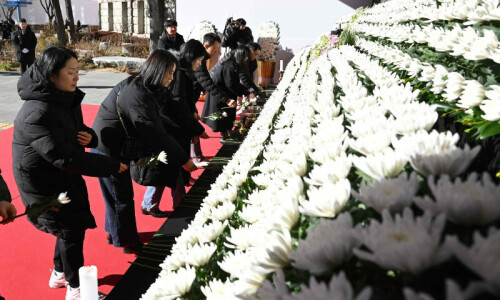 KARACHI, July 27: Hundreds of poisonous snakes, captured in Sindh without permission of the provincial wildlife department, are taken to the Islamabad-based National Institute of Health every year for the preparation of anti-snake venom serum (ASVS).
KARACHI, July 27: Hundreds of poisonous snakes, captured in Sindh without permission of the provincial wildlife department, are taken to the Islamabad-based National Institute of Health every year for the preparation of anti-snake venom serum (ASVS).
All these snakes, kept in unnatural conditions, die prematurely after being milked twice or thrice, Dawn has learnt.
According to sources, the NIH’s demand for the snake species, all types of poisonous snakes, has fallen over the years.
A few years ago, 5,000 to 10,000 snakes used to be captured in Sindh, but now their number has come down to 2,000. The NIH has been producing ASVS since 1960s for public sector hospitals.
Wildlife experts say the practice in vogue for decades has contributed immensely to the depletion of the indigenous snake population in Sindh. Other factors include smuggling of snakes, their local use in manufacturing different products, the loss of habitat due to deforestation, reduced flow of fresh water, large-scale stone excavation, agriculture expansion and extensive use of pesticides.
The NIH gives a yearly contract for snake-catching and the contractor does the job with the help of jogis (snake-charmers) spread all over Sindh.
The snakes are then stuffed into boxes and transported to Islamabad. Dr A.A. Qureshi, a wildlife expert and former director of the Karachi Zoological Gardens, who has remained in contact with some scientists working at the NIH, claims that snakes often die from hunger at the laboratories.
“I came to know the fact from experts who have worked at the NIH. They just don’t feed them their natural food. One wonders why the premier public health laboratories that serve as the sole manufacturer and supplier of ASVS could never set up a reptile house. If snakes are properly fed, not only the quality of venom will improve but one can extract venom from the same snake for many years.”
Deploring what he termed ‘a highly irresponsible methodology’ on part of a scientific organisation, Dr Qureshi said the wrong practice, along with other factors, had caused irreparable damage to the ecology of the areas where these indigenous snakes once lived.
“Snakes are agriculture-friendly reptiles and feed on field rats and other rodents that eat away about 25 per cent of crops in normal conditions. Now, as their number has shrunk, damage to crops has increased up to 40pc. This has disturbed the entire web of life in those areas, the assessment of which has never been done.”
Recollecting his visit to the NIH about 15 years ago, a senior herpetologist told Dawn that he had the opportunity to go inside the laboratories and see hundreds of boxes full of snakes.
“As we came in, the doctor working there disappeared. One of the staff told us that the NIH didn’t have funds to arrange rats for snakes, so they are fed a mixture of milk and eggs.
“A funnel is put inside their mouths for this purpose due to which their fangs, at times, break off. Many die prematurely, as they are kept in unnatural conditions and their skins sold.”
This reporter also came in contact with a snake-charmer operating in Makli who admitted selling snakes to the National Institute of Health (NIH). The man in his late 70s, wishing not be named, claimed to have a permit from the laboratories and had been selling snakes to a contractor for the NIH for decades.
“I am unable to do the job on my own now, but all snake-charmers operating in Sindh know me very well. I ask them to collect snakes for me. I arrange around 400 to 500 snakes whenever asked for,” he said while complaining of low prices now snakes fetch.
The NIH’s stand
To many concerns raised on the issue, Shahid Akhtar, head of the Biological Production Division, NIH, said: “Through an annual open tender, the institution receives 1,600 snakes of only four species; Cobra Naja naja 500, Russel’s viper 300, Echis carinatus 500, Krait Bungarus ceruleus 300, to make 30,000 vials of 10ml of ASVS.
“The reptiles are collected from the desert areas of Sindh by snake-catchers who work for contractors. They are kept in secured cages and fed with some suspension of milk and eggs. Venom is extracted twice or thrice with an interval of 15 to 20 days. A snake normally survives two to three milking.”
When asked why do snakes have premature deaths and which law authorised the National Institute of Health (NIH) to catch snakes in Sindh and keep them in unnatural conditions, he refused to answer. He also declined to give any details about the disposal of snakes’ remains. Asked whether the Sindh Wildlife Department had given any permission to the NIH for catching snakes, Ghulam Rasool Channa, Sindh wildlife conservator, replied in the negative.
“They have never approached us. The NIH is using snakes for research and medicinal purposes which is allowed under the law, but still it’s an irregularity and they should abide by the procedures,” he said.
About the conservation status of reptiles, Dr Fehmida Firdous at the SWD said that though the Sindh Wildlife Protection Ordinance 1972 accorded ‘protection status’ to only certain species of reptiles, Pakistan, being a signatory to the Convention on International Trade in Endangered Species, was bound to protect all species of reptiles and wild mammals.
“So, there is a need to revise the ordinance. A ban on the export of all types of reptiles and wild mammals, however, was imposed in 2005 by the federal government through a notification and is still in practice. Earlier, such a ban had existed periodically during different governments.”











































Dear visitor, the comments section is undergoing an overhaul and will return soon.